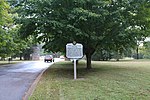On August 29, 1996, Janet Gail March (née Levine February 20, 1963 – August 15, 1996), a children's book illustrator from the Nashville suburb of Forest Hills, Tennessee, United States, was reported missing to police by her family. Her husband, Perry March, a lawyer, told police he had last seen his wife when she left the house on the night of August 15, two weeks earlier, following an argument. He claimed she had packed her bags for a 12-day vacation at an unknown location and driven away. She was never seen alive by anyone else afterwards.
Janet's car was found at a nearby apartment complex a week after the police report, apparently having been there for some time. Other evidence began to suggest that Perry had fabricated some evidence of his wife's supposed motive for departure, and attempted to tamper with or destroy other items that might have provided evidence. Police soon reclassified the case as a homicide, despite the absence of Janet's body, and named Perry as a suspect. Shortly afterwards he moved back to his native Chicago area with the couple's two children. After his in-laws won visitation, he fled with the children to Mexico, where his father, Arthur, a former U.S. Army pharmacist, had retired. The case received attention in the national media, where it was the subject of two segments on the CBS News program 48 Hours.For several years afterwards, Perry fought his former in-laws in state and federal court over the administration of Janet's property and the status of his children. Janet was declared legally dead in 2000. Nashville police continued investigating the case and found further evidence suggesting Perry had in fact killed her. In late 2004 a grand jury indicted him on murder and other charges in her death; it was kept secret by police until the following year, when they were able to arrange for him to be arrested in Mexico and extradited to Tennessee to face trial. While he was in jail, police learned that March was conspiring with his father and another inmate to have his in-laws killed; Arthur March was then arrested and extradited himself. After telling prosecutors that he had helped Perry move Janet's body to Kentucky, he agreed to cooperate with them and testify against his son in exchange for a reduced sentence; however he was unable to recall exactly where he had disposed of the body and it has never been found. Arthur's plea bargain was rejected and he died in federal custody shortly after beginning his sentence.
Perry was convicted of all charges in 2006, despite the absence of Janet's body. He unsuccessfully appealed the conviction in state court, alleging some of the evidence had been gathered in violation of his constitutional rights. A federal appellate panel reviewing his later habeas petition agreed that the case presented some issues but did not feel it had the statutory authority to overturn the conviction on those grounds; and in any event it found the evidence against Perry had been so overwhelming as to make those issues harmless error. In 2015, the United States Supreme Court denied his certiorari petition, exhausting his appeals. He has maintained his innocence throughout the case, and is currently serving his 56-year sentence at Tennessee's Morgan County Correctional Complex.






